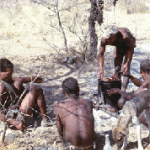Our Egalitarian Eden

[The current issue of Science magazine features a special section on "The Science of Inequality," comprising some 20 articles, together with other resource materials. All are available in full on the web. See also The Ancient Roots of the 1%. -- moderator]
Seek the richest family in a traditional camp of the Ju/'hoansi/!Kung people of the Kalahari Desert in Africa, and you will almost surely fail. There is no such thing. These hunter-gatherers traditionally moved periodically and had few possessions. What they had, they shared—food, weapons, property, even territory. The poorest looking hut in a camp likely belonged to the leader, explains anthropologist Richard Lee, a professor emeritus at the University of Toronto in Canada, because leaders try to avoid looking superior.
Many anthropologists think this egalitarian lifestyle was an essential feature of hunting and gathering societies. In contrast with both today's titans of Wall Street and the alpha males of the great apes, people in these societies “had an ethic of sharing that was central to their way of life,” Lee says. “No one takes precedence over anyone else.”
Our species has lived as hunter-gatherers for more than 90% of our history, Lee notes. Today's economic inequality goes back thousands of years (see main story, p. 822) but in evolutionary time it is relatively recent. Although some of our great ape cousins and arguably our ape ancestors lived in sometimes brutal hierarchies, humans adopted an egalitarian way of life for all but the last 10,000 years.
Achieving and sustaining such egalitarianism is not easy, anthropologists say. “The only way you can avoid hierarchies is that you work very hard to head off,” says Christopher Boehm, a cultural anthropologist at the University of Southern California in Los Angeles. Like all animals, humans are born unequal—some run faster, plan better, or make friends more easily than others. And we instinctively want the best for ourselves, even at the expense of others. That sets the stage for some to dominate.
To find out why humans shunned hierarchies for most of our history, anthropologists have studied living hunter-gatherers around the world, including Native Americans and the Ju/'hoansi/!Kung. Iconic studies of these societies show that boasting and other self-aggrandizing behaviors are not allowed. Offenders are teased, ignored, banned from camp, or, in extreme cases, killed. Humility, humor, and strict protocols about distributing meat helped keep people on an even footing, says Boehm, who has surveyed the ethnographic literature. For example, !Kung people traditionally downplay their accomplishments: A hunter will say he's caught only a small skinny animal, even if it's big and meaty, and his comrades will agree. “You have to demean yourself,” Boehm says.
Lee and his colleagues, who observed the Ju/'hoansi/!Kung for years, found that to counter differences in hunting prowess, men exchange arrows before they hunt. The owner of the arrow, not the bowman himself, gets the credit and decides how to distribute the meat while everyone looks on.
Other traditional societies have similar customs, Boehm found in an unpublished analysis. Of today's 330 foraging societies, he examined 56 that live in conditions resembling those of Paleolithic hunter-gatherers. Among these groups, having someone other than the successful hunter distribute the meat “is universal,” he says.
Several factors prevented the concentration of wealth and reinforced cooperation in these groups. Scattered, unpredictable food resources encouraged nomadism, a lifestyle that ensured no one accumulated many material goods. Cooperative hunting, in turn, yields more than enough meat to go around, and groups that shared equitably were at an evolutionary advantage because all of their members were strong enough to be good hunters or fighters should the need arise, says economist Samuel Bowles of the Santa Fe Institute. And cooperation is self-reinforcing: Sharing the spoils promotes further cooperation and self-sacrifice (Science, 4 September 2009, p. 1196). “Inequality may be the enemy of cooperation,” Bowles says.
Boehm also stresses that the behavior of the lower ranks can help quell dominant individuals. In a seminal paper back in 1993, he proposed that several low-ranking men could band together to oust a too-greedy or violent alpha male. He confirmed this idea based on a survey of behaviors of 48 seemingly egalitarian groups. This isn't a lack of dominance but a reversal of it, he says: “An apparent absence of hierarchy was the result of followers' dominating their leaders rather than vice versa,” he wrote.
Over the millennia, as societies began accumulating surplus food and goods, the inequality held in check for thousands of years re-emerged. Yet humans “have experienced an extraordinary amount of equality,” Bowles says. “The question is whether conditions now will allow us to experience the egalitarianism of the past.”
Science 23 May 2014:
Vol. 344 no. 6186 pp. 824-825
DOI: 10.1126/science.344.6186.824
